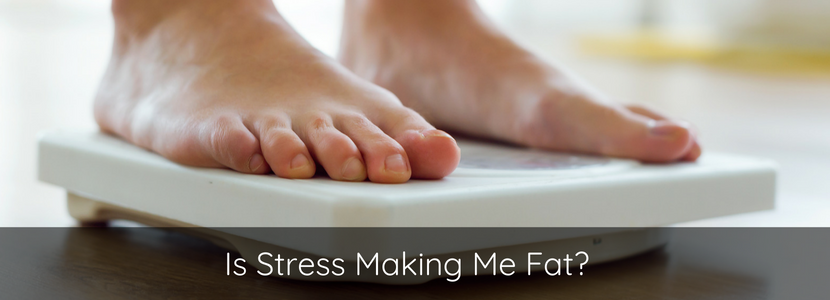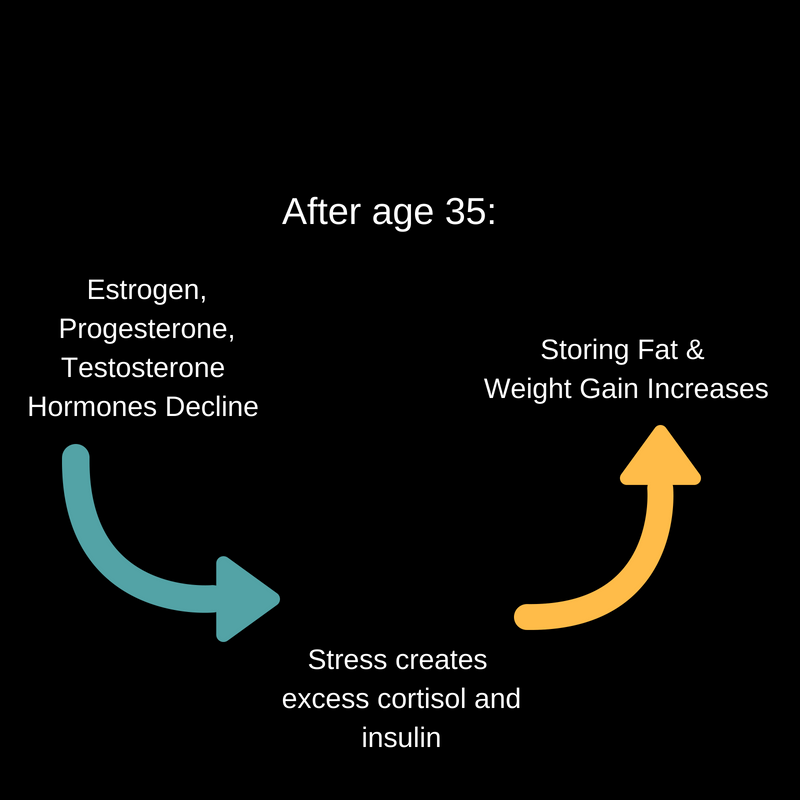
“I’m working out everyday, but I’m not seeing results!”
“I’m so frustrated – I push harder and harder, yet I keep gaining weight!”
“I am trying everything, but I can’t seem to lose weight – I am about to give up.”
There is nothing uncommon about these statements that we hear regularly. Clients all of sudden gaining weight and no matter what they do, their bodies aren’t responding in the manner they’ve hoped for.
It can be downright frustrating and depressing when we change our lifestyle to incorporate intense workouts and movement only to see either no weight loss, or even worse, more weight gain.
And if you find this happening to yourself, how far do you take it until you simply give up and surrender to the thought of “this is what happens when we age”?
Well, we are here to tell you it doesn’t have to stop with that. There can be specific reasons for mid-life weight gain without loss and this may shock you, but many times, this is due to…
STRESS!
Do you remember your 20s? If you ate a little (or a lot!) of unhealthy foods, you could workout a little harder the next day and still maintain your weight? Being able to lose weight at this age tends to be much easier.
However, as early as our mid-thirties, we can see that change.
So what’s going on?
Welcome to the world of fluctuating hormones.
In our mid to late-thirties our hormones begin to decline. Estrogen and progesterone for women and testosterone for men begin to fluctuate, making us more susceptible to cortisol and insulin (which can be at greater levels when stressed or working out too much!).
What’s wrong with that?
Well, cortisol and insulin are fat storing! They tell the body to store fat rather than burn it. We think this is a natural survival mechanism from years ago to conserve fat when the body needed it.
What does this result in?
WEIGHT GAIN!
Here is how this happens…

What type of stress creates this cycle?
Two different kinds: external and internal.
External Stress refers to:
– Jobs
– Committments
– Relationships
– Responsibilities
Internal Stress refers to:
– Worry
– Anxiety
– Fears
– Self deprecation
When these stressors are traumatic, intense, and/or chronic, our bodies can become extremely sensitive to cortisol and insulin. And when our hormones that regulate cortisol and insulin levels are declining, we can find ourselves even more susceptible to the effects of stress – yes, especially weight gain.
How can you tell if this is the cause of your weight gain?
At our offices, we complete specific testing to analyze hormones. Specifically, we test:
– adrenal and cortisol levels with an Adrenal/Cortisol Saliva Panel
– estrogen, progesterone, and testosterone levels
These tests allow Dr. Graves to understand what the root cause of the weight gain may be. From here, a customized regimen can be created to decrease stress, increase regulating hormones, and help the body balance itself out.
What can be done about external and internal stressors?
Plenty!
There are seemingly endless options to reducing stress and lowering cortisol and insulin levels – it just starts with some determination and follow through!
Here are our tips to reducing stressors!
How to reduce external stress (keep in mind these are conscious choices!):
– saying “no” to optional commitments
– movement such as walking, hiking, and light weight lifting
– active rest such as meditation, yoga, daily walks
– good, solid sleep
– fulfilling sex
– intense exercise limited to 30 minutes or less, once or twice a week (we recommend an exercise program such as HIIT 20-30 minutes per week)
– acupuncture to assist with better sleep, mindfulness, and slowing down
Remember…when balancing hormones and losing weight, less can be more! Consider reducing the amount of intense workouts to 1-2 days per week and add in more active rest movement for the remaining days.
How to reduce internal stress:
– become aware of negative thoughts and learn to change perspective
– schedule regular acupuncture appointments to reduce cortisol levels and balance hormones
– take herbal supplements such as adaptogens (we like Adrenal Response™® and Adreno Mend™) to aid in adrenal fatigue
– take Enerphos® to decrease cortisol levels directly after intense workouts
– digest plenty of amino acids to help restore the body’s hormones
– take herbs for restful sleep if needed
But what should you eat?
This is key when pairing with decreasing stress, cortisol, and insulin and losing weight!
Most importantly: do not skip meals!
Make sure to have plenty of protein with breakfast and with each meal throughout the day. Protein assists in keeping insulin appropriately leveled.
A detox and/or cleanse can help short-term, but most of this weight loss is water based. Make sure that after a healthy detox or cleanse that a healthy diet is followed.
For additional recommendations, Dr. Graves can prescribe a specific diet plan tailored to your test results and root cause.
The good news is that there may be a definite reason for your weight gain and a real reason that weight loss hasn’t been going well.
Dr. Graves recommends weight loss of 1-4 pounds per month which can lead to longer results (no one wants that extra weight to come back!). This may be just around the corner for you!
Is it time you try to find the root cause of your weight gain and begin to lose it in a healthy, realistic, and precise way rather than just guessing?
Don’t give up – let us help!
If you live in Castle Rock, Castle Pines, Highlands Ranch, Lone Tree, Parker, Centennial, Larkspur, Monument, Colorado Springs, or the greater Denver metro area, call us now at (303) 688-6698 for a free 15 minute phone consultation with Dr. Graves to discuss your challenges.
We look forward to helping you achieve your goals!

Leave a Reply